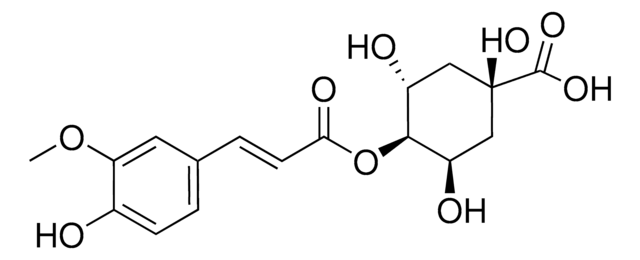PHL80425
3,4-Dicaffeoylquinic acid
phyproof® Reference Substance
Sinónimos:
4,5-Di-O-caffeoylquinic acid, 4,5-Dicaffeoylquinic acid (CAS), Isochlorogenic acid C
About This Item
Productos recomendados
grade
primary reference standard
product line
phyproof® Reference Substance
assay
≥95.0% (HPLC)
form
solid
manufacturer/tradename
PhytoLab
storage temp.
2-8°C
SMILES string
O[C@@H]1C[C@@](O)(C[C@@H](OC(=O)\C=C\c2ccc(O)c(O)c2)[C@H]1OC(=O)\C=C\c3ccc(O)c(O)c3)C(O)=O
InChI
1S/C25H24O12/c26-15-5-1-13(9-17(15)28)3-7-21(31)36-20-12-25(35,24(33)34)11-19(30)23(20)37-22(32)8-4-14-2-6-16(27)18(29)10-14/h1-10,19-20,23,26-30,35H,11-12H2,(H,33,34)/b7-3+,8-4+/t19-,20-,23+,25-/m1/s1
InChI key
UFCLZKMFXSILNL-RVXRWRFUSA-N
¿Está buscando productos similares? Visita Guía de comparación de productos
Categorías relacionadas
General description
Application
- Neuroprotection in Parkinson′s Disease: Research on 3,4-Dicaffeoylquinic acid from Calendula officinalis highlights its potential neuroprotective effects through modulation of the PI3K and ERK signaling pathways, suggesting its application in Parkinson′s disease management (Zhang et al., 2024).
- Antioxidant and Anti-inflammatory Activities: Studies on the antioxidant and anti-inflammatory properties of 3,4-Dicaffeoylquinic acid in Merremia umbellata extract suggest its therapeutic potential in treating inflammatory conditions, making it a valuable component in natural phenolic compound research (Lee et al., 2023).
- Hypoglycemic Effects on Type 2 Diabetes: 3,4-Dicaffeoylquinic acid has been studied for its hypoglycemic effects via network pharmacology and transcriptomics, showing promise in type 2 diabetes treatment. This research underscores its importance in biochemistry and pharmacological innovations (He et al., 2024).
- Screening Natural Antioxidants: The compound′s effectiveness in screening and evaluating natural antioxidants demonstrates its utility in developing analytical standards for identifying potent bioactive compounds in various botanical parts (Yang et al., 2024).
- Molecular Docking for Drug Development: 3,4-Dicaffeoylquinic acid is used in molecular docking studies to identify interactions with PPARγ, aiding in the discovery of potential drug candidates from natural sources. This application is crucial for advancing drug discovery in biochemistry and pharmaceutical sectors (Elkhattabi et al., 2023).
Other Notes
Legal Information
Storage Class
11 - Combustible Solids
wgk_germany
WGK 3
flash_point_f
Not applicable
flash_point_c
Not applicable
Elija entre una de las versiones más recientes:
Certificados de análisis (COA)
¿No ve la versión correcta?
Si necesita una versión concreta, puede buscar un certificado específico por el número de lote.
¿Ya tiene este producto?
Encuentre la documentación para los productos que ha comprado recientemente en la Biblioteca de documentos.
Nuestro equipo de científicos tiene experiencia en todas las áreas de investigación: Ciencias de la vida, Ciencia de los materiales, Síntesis química, Cromatografía, Analítica y muchas otras.
Póngase en contacto con el Servicio técnico






